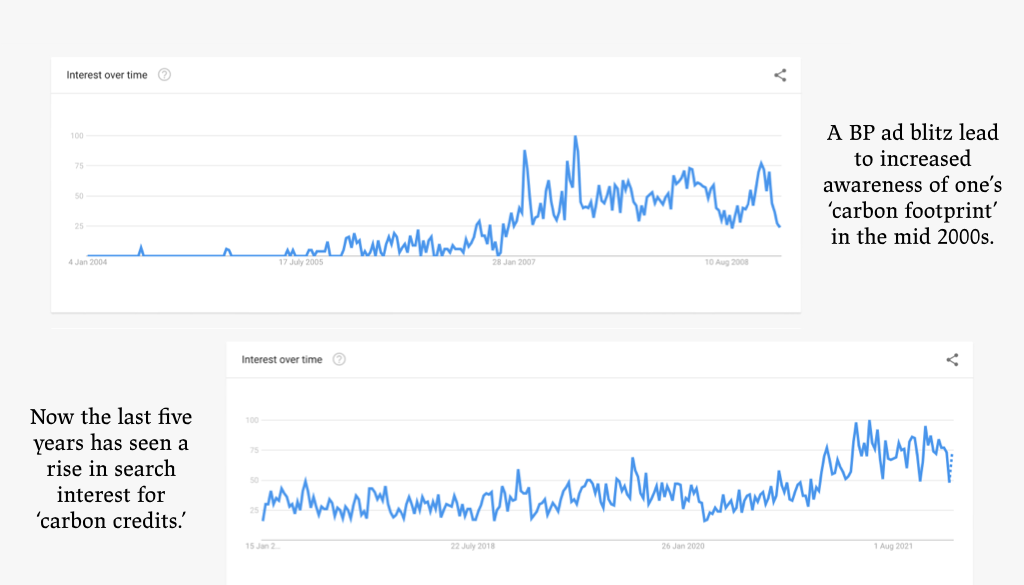MoneyHacks 2022: How High Flying Changemakers Can Find the Best Carbon Cancelling Deals
By Loughlin Shannon
Now entering its third year, Australia has seen many highs and lows during the global pandemic. Covid’s impact stretched beyond just our health system, with Australia’s economy reaching record highs as businesses adapted to the changing times, but also record lows amid Covid case surges.
Few expected these economic highs and lows to occur so close together, but in true Roaring 20s style, 2022 brought us just that. After a $21 billion Christmas cash splash, ANZ data shows Australia’s retail spend has now fallen to Covid lockdown levels. And Sydney’s spending is at its lowest point since the pandemic began.
With many Aussies tightening their purse strings once again, changemakers may be wondering how to make a difference on a budget. So, with Australian international and interstate borders (mostly) open, let’s start with an airline add-on most change-making travellers won’t think twice about.
Your Carbon Footprint: Polluter Propaganda?
Since British Petroleum popularised the idea of one’s own ‘carbon footprint’ in a 2003 advertising blitz, awareness of consumption-driven pollution has risen substantially. And every step of the way, big businesses have been eager to encourage consumers to take personal responsibility for their environmental impact.
Carbon footprint calculators became widespread online, and although methodology varies between services, it’s now never been easier for one to seek out an estimate of their own environmental impact. But the rise of e-commerce, spurred on by the pandemic, began the trend of bringing one’s footprint to them before they even asked.

Insert Graphic One
Buy-now-pay-later service Klarna’s app shows customers the emissions created from delivering their online shopping — a journey I covered extensively last year. And the major Australian airlines go one step further, selling carbon offsets to their passengers when they check out online.
Those airline offsets may seem like a good deal for changemakers. I took advantage of an offer to offset 149kg of carbon last year for just $1.70, and 100 per cent of my contribution was passed on to carbon offset projects around the country. My donation was even matched dollar-for-dollar by the Qantas Group.
But a 2017 report from consumer advocacy group CHOICE found that while the airlines’ carbon offset programs were Australian Government accredited, none of them were certified by Gold Standard — an international standards body established by the World Wildlife Fund in 2003.
And ‘accredited’ programs don’t necessarily offset the exact amount of carbon you’re paying for. A 2021 Guardian/Greenpeace investigation found 10 forest protection schemes made predictions that “were often inconsistent with previous levels of deforestation” and “overstated” the threat to the trees they allegedly protected.
Verra, the agency which accredited those projects, strongly disputes that investigation’s findings. In a statement, they wrote “the Guardian article exhibits clear bias,” and “is riddled with substantive errors that betray ignorance about how carbon offset credits work”.
Price Match Carbon Credits From the Comfort of Your Couch…
So your mileage with carbon credits may vary, but let’s say you’ve been travelling over Christmas and you want to buy some anyway. Where can you get the best deal, and how can you be sure every kilo of carbon you pay for is really offset?
The answer: airline offers aren’t the place to look. While the airline I flew with charged me $11.41 per tonne of carbon, you can get a far better deal by shopping around. And the United Nations operates an online marketplace where you can do just that.
The UN Carbon Offset Platform allows anyone to purchase carbon credits directly from Clean Development Mechanism projects around the world. After you make a purchase, you get sent a certificate you can personalise, showing how much carbon you’ve cancelled and why you cancelled it.

So how does the UN’s platform stack up? Right now, two-thirds of the CDM projects listed beat Jetstar’s offer on carbon price. And the UN says all CDM projects “meet strict technological standards and are rigorously scrutinised through an international monitoring, reporting and verification process”.
The cheapest project on the platform right now — a rice husk based cogeneration plant with 2.5MW of generation capacity for the Indian electricity grid — will sell you a tonne of carbon for just $4.88. That’s a whopping 57 per cent saving compared to Jetstar’s checkout offer.
SAVE SOME MONEY: Shop around for carbon credits to get the best deal!
You may be getting a raw deal buying carbon offsets with your plane ticket, but that’s not the airlines’ fault. The ABC reported in December that 2021 was a “bull market” for domestic carbon credits, driving up prices for everyone. But airlines do have control over another part of the carbon credit story.
…Or Leave the Airlines to it
Of course, you could save even more money on carbon credits by just letting your airline pick up the tab. A 2016 agreement made by the member states of the UN International Civil Aviation Organisation (ICAO) requires airlines — including those in Australia — to buy a certain number of carbon credits every year themselves.
The agreement is called the Carbon Offsetting and Reduction Scheme for International Aviation (CORSIA), and it initially required airlines to have net-zero emissions growth beyond an average of 2019 and 2020 levels. This would mean if an airline emitted more carbon in 2021 than the 2019/20 average, they would have to offset the difference.
But, just like everything else, Covid changed this plan for the worse. 2020 saw a halving of flight activity compared to 2019, which reduced CORSIA’s predicted emissions average by 25 to 30 per cent according to the International Energy Agency (IEA).
This would have substantially increased emissions reduction requirements, so the International Air Transport Association asked the ICAO to remove 2020 from the average. ICAO agreed, increasing allowed emissions, which reduced carbon offsetting requirements by between 25 and 75 per cent.
The IEA says a combination of this change and a slow post-Covid recovery for the aviation industry will eliminate carbon reduction requirements for airlines entirely. “If flight activity rebound takes as long as most industry projections expect, this decision will nullify any offset obligations during CORSIA’s pilot phase.”
So, don’t feel too guilty about skipping out on carbon credits when flying, the airlines sure didn’t.
SAVE EVEN MORE: Leave cancelling carbon to the big polluters — they’ll be required to.
Save money and the planet this January with the Humanitarian Changemakers Network! We’ve got tips for getting the best deals on reducing your carbon footprint, shopping mindfully, and the most effective charities to support. Just go to humanitarianchangemakers.net/news or search ‘Changemaker Q&A’ on your preferred podcast platform.
This week: are high flying changemakers getting a raw deal on carbon credits? We’ve found the best deal for travellers to reduce their emissions — and it’s not from airlines. Search Changemakers Q&A on your preferred podcast platform to listen now!




